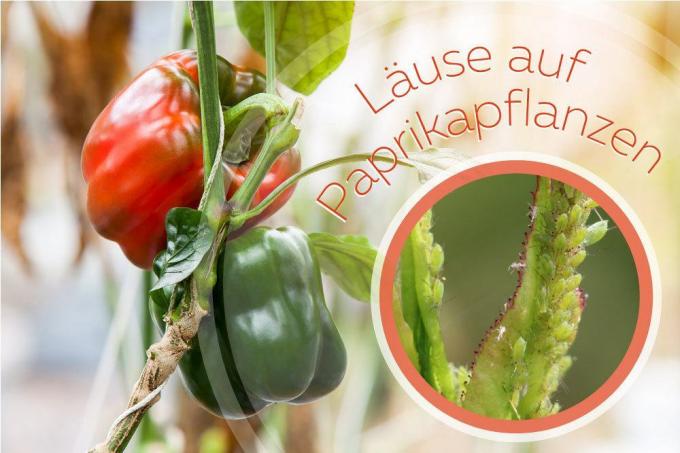
table of contents
- paprika
- lice
- Louse infestation
- Recognize plant lice
- Combat
- Home remedies
Bell peppers take time to reach the optimal point of ripeness. It is annoying when a lice infestation ensures that growth is inhibited or the pepper plants die. To prevent this from happening, it is advisable to find out in a timely manner how to control lice on peppers.
paprika
Sweet peppers, chilli and hot peppers are among the most popular vegetables for domestic cultivation. They don't require a lot of attention and care. However, this genus of plants is not only tasty for humans, but also for lice. Once the first have come together, it doesn't take long for the Capsicum (botanical name) to be damaged for the first time. The key here is to act quickly.
lice
Garden season for lice
When temperatures rise in early spring, aphids and conspecifics emerge from their warm winter quarters or grow out of hibernation. Afterwards they are plagued by hunger and they go in search of food. They can be found in almost every garden by the end of May at the latest. If the hobby gardener is well prepared, they usually move from neighboring garden to neighboring garden. They attack countless plants - especially in the vegetable patch they find juicy food.
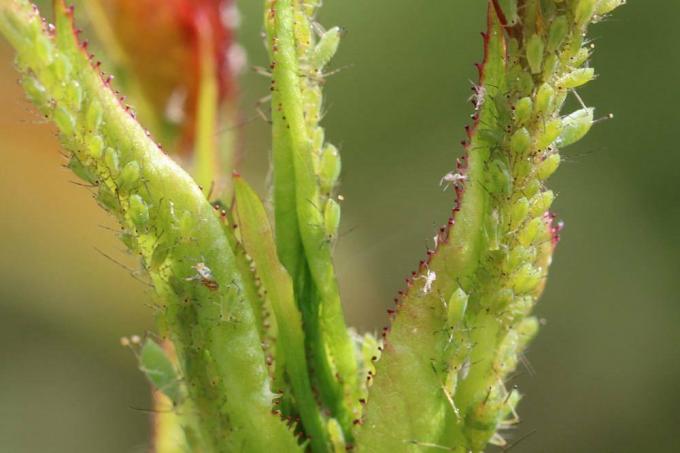
They can be expected on paprika plants from early summer. The young plant tissue of the leaves is a delicacy for lice. From here they attack other plants and vegetables in the area. If they are not stopped, they can destroy entire crops and also attract fungi.
Louse infestation
Reasons for the lice damage
In addition to food consumption, there are other reasons why sternorrhyncha (plant lice) are increasingly moving into gardens and greenhouses. First and foremost, it is the mostly exaggerated cleanliness / hygiene that is brought about by hobby gardeners, as well as artificial fertilization. This changes the natural soil climate and plants become more susceptible to serious damage from plant pests. Deficiency symptoms also contribute to the susceptibility to diseases caused by pest infestation.
Aphids & Co. particularly like the juice from young plants, which is why all types of paprika are particularly at risk during the rearing phase, especially after pricking. Due to poor culture conditions, their resistance weakens and can therefore get through a lice infestation die in the worst case, while adult pepper plants an infestation well cope with.
Recognize plant lice
In order to be able to react properly in the event of a pest infestation on your bell peppers, it is necessary that you identify them. As a rule, these are small animals with a size of a few millimeters that you can see as dots with the naked eye. Depending on the species, they differ in color. Other identifiers are the same or similar in strength.
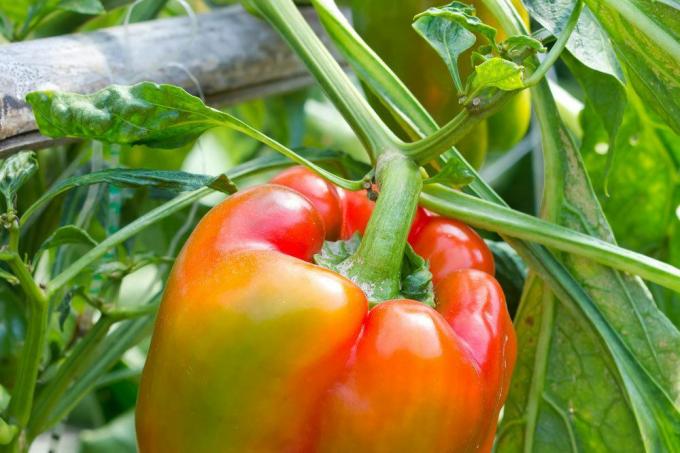
Louse traits
- Size: between four and seven millimeters
- Color: aphids greenish or white, other plant lice brownish to black
- mostly wingless - new generations are few exceptions
- Proboscis
- usually sit on the undersides of the leaves and on the stems
- After a few days of initial infestation, entire colonies quickly form
Plant symptoms
- white specks on the upper side of the leaf (lice piercing holes)
- sticky coating on the leaves (honeydew)
- initially yellowish-brown discoloration of the infected leaves
- leaves black in advanced stage
- unusually high leaf drainage
- Leaves wither and die
- Stunted growth
- Plant loses stability
Combat
There are several options to choose from to control aphids on pepper plants. It must be remembered that it is a vegetable whose fruits want to be consumed. The use of toxic and / or harmful chemical insecticides is more than inappropriate for this reason. In addition, the Plant Protection Act severely restricts the chemical options available to protect the environment and people. Alternatives range from organic products from specialist retailers to effective home remedies.
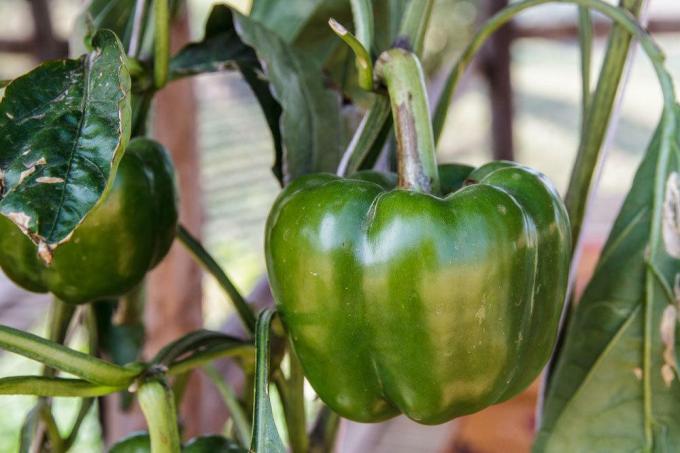
Biologically based products
One of the best-selling remedies for lice on paprika plants is based on neem oil. It is an oil obtained from the seeds of stone fruits of the neem tree. Neem oil products usually consist of all-natural ingredients that break down quickly and are neither toxic to humans nor harmful to other beneficial insects. If the peppers are treated with neem oil, the viscous oil settles in the aphids' respiratory tract. It sticks there, the lice can no longer breathe and suffocate.
The rest of the neem oil is usually completely washed off the peppers by rain and watering. After they die, the dead aphids either fall to the ground or are washed down with it. It is important that the pepper plants are completely moistened with neem oil in order to reach every louse so that no reproduction leads to renewed infestation.
Control by beneficial insects
The most natural way is fighting with so-called beneficial insects. These include certain insects that are considered to be predators of lice. These are very effective. It is not uncommon for them to kill several hundred lice a day.
If bell peppers are infected, there seem to be no or too few beneficial insects in the area. You can attract them, but that would take too long in an acute case. For this reason, beneficial insects against aphids can be purchased. You can find these in local specialist shops or you can order them on the Internet.
The main natural predators of lice include:
- Ladybug
- Lacewing
- Predatory gall mosquito
- Hoverflies
- Parasitic wasps
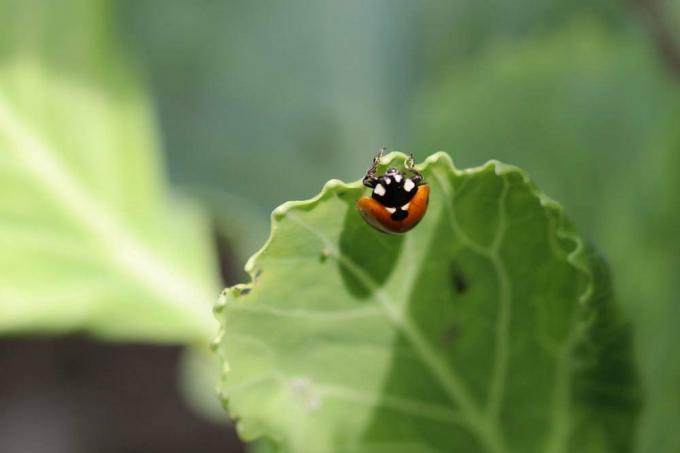
TIP: If you grow your peppers in a greenhouse, they should be put outside for beneficial insects to use. As a rule, beneficial insects do not multiply in rooms, so that they cannot receive the next generation for prevention.
Home remedies
With home remedies against lice infestation
Do you prefer to use home remedies or do you want to react quickly, but you have no way of quickly getting a control agent or beneficial insects? In that case, you can create a solution yourself using ingredients that are usually found in every normal household or found in nature. The following home remedy recipes have already proven to be effective control measures against lice:
milk
- Mix 200 milliliters of water with 100 milliliters of milk
- Pour the mixture into a spray bottle
- Spray the pepper plants dripping wet with the solution
- especially do not forget the undersides of the leaves, new shoots and stems
- Check the aphid population the next day
- if any are still visible or you suspect more, repeat the process after two days
Rapeseed oil
- Stir 90 milliliters of rapeseed oil into five liters of water
- add a few splashes of detergent (improves the miscibility of the oil)
- mix well
- Pour the mixture into a spray bottle
- Sprinkle the pepper plants generously with it
- a repetition is usually not necessary, but can be done after seven to eight days
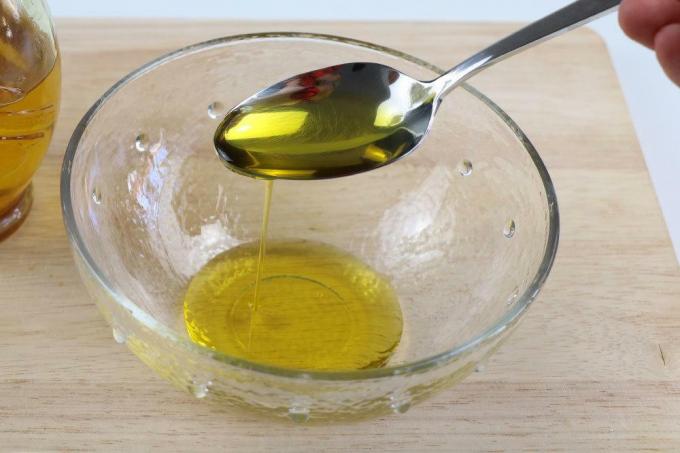
Dish soap solution
- Put five milliliters of washing-up liquid in half a liter of water
- add a dash of spirit
- stir well
- fill in a spray container
- Inject the peppers dripping wet
- The process can be repeated every two days
- Even a large infestation should be completely killed after a week at the latest
TIP: Instead of washing-up liquid, you can also use soft soap without additives or a soap for making soapy water.
Rhubarb leaf broth
- Boil 500 grams of rhubarb leaves in three liters of water for 30 minutes
- Sieve the leaves and collect the brew
- Let the broth cool down
- Spray or wipe the plant with the broth
- Pepper plants need to be moistened well with the broth on all sides
- Application can be repeated at one-week intervals
- Rhubarb broth is also considered a preventive measure against aphids
Nettle liquid manure
- Immerse about one kilogram of fresh nettles in ten liters of water
- Adding a handful of rock flour minimizes the development of odors
- Let it rest / ferment for between one and two weeks (the warmer the temperature, the faster it ferments to a liquid manure)
- To use, dilute one liter of the liquid manure with ten liters of water
- Wet the peppers completely with the liquid manure
- can be repeated every 14 days
- at the same time acts preventively for a new infestation
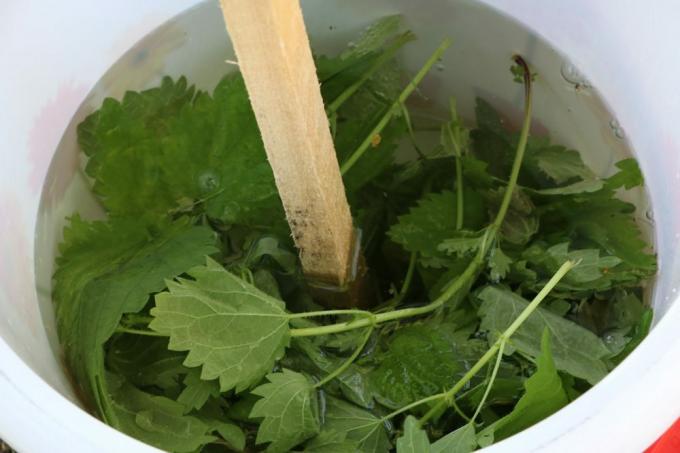
Oregano tea
- Add 100 grams of fresh or ten grams of dried oregano with boiling water (like tea)
- Let it steep for about 15 to 20 minutes
- Sieve the oregano leftovers
- pour a third of water
- Pour "tea" into a spray bottle and generously wet the pepper plants until it drips
- Application can be repeated after three or four days if necessary
Onion and garlic broth
- Chop 40 grams of garlic or onions
- Boil in five liters of water for at least 20 minutes
- Let it steep for three to four hours
- Sieve onions or garlic
- Pour the broth undiluted into a spray bottle
- Spray paprika well and everywhere
- Repeat every ten days recommended
- Garlic and onion broth have an optimal preventive effect not only against lice on paprika plants
TIP: If you stick thick, peeled garlic cloves between your capsicum in the garden bed or in the nursery pot, aphids will stay away from the pepper plants.

